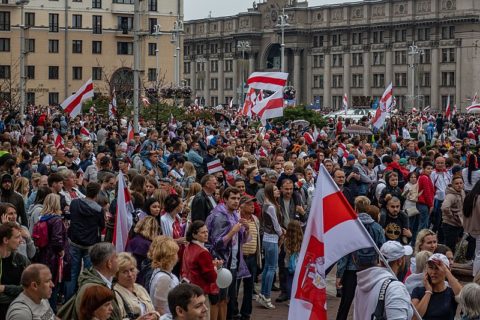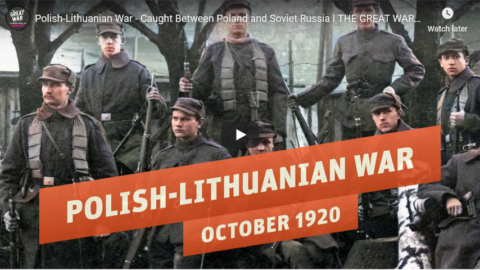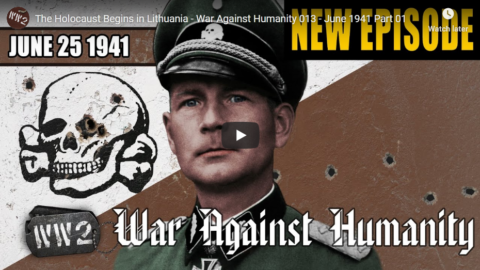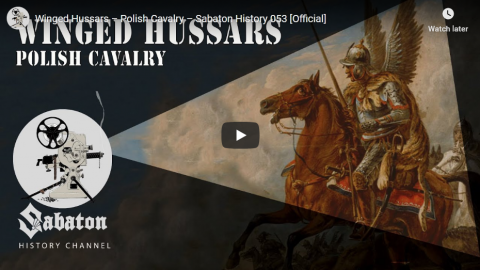World War Two
Published 14 Oct 2023Churchill, Stalin, and Roosevelt meet at the Moscow Conference and talk about future “spheres of influence” in the Balkans. They also make plans for the future of Poland. In the field the Soviet Red Army completes the isolation of Army Group North and also advances in Hungary and Yugoslavia. The Allies enter Aachen in the west and cross the Rubicon in Italy. The Americans are still fighting the Japanese on Peleliu, and this week also make raids against Japanese airfields ahead of next week’s invasion of the Philippines.
01:00 Recap
01:22 The Moscow Conference begins
03:43 Isolating Army Group North
06:29 Soviet advances toward Belgrade
08:14 The Debrecen Operation
13:20 Horthy and Hungary
14:30 Chiang Kai-shek accuses Joe Stilwell
16:19 American raids on Formosa
19:29 The fight for Peleliu continues
20:01 Antwerp and Aachen
22:01 The Allies cross the Rubicon
(more…)
October 15, 2023
The Isolation of Army Group North – WW2 – Week 268 – October 14, 1944
October 8, 2023
The End of the Warsaw Uprising – WW2 – Week 267 – October 7, 1944
World War Two
Published 7 Oct 2023The Warsaw Uprising comes to its conclusion, a tragic one for the Poles. In the field in Europe, there are Allied attacks toward Aachen, Bologna, and Debrecen, while in China the Japanese have begun a new phase of their Ichi Go Offensive.
(more…)
April 22, 2023
Hitler’s Revenge on the Italian People – War Against Humanity 101
World War Two
Published 21 Apr 2023As the RAF closes in on Berlin and the German Army is running dangerously low on men, the Nazi leadership is determined to use their resources to spread their crimes deeper into Hungary and Italy.
(more…)
March 27, 2023
Why Russia Lost the Polish-Soviet War
The Great War
Published 24 Mar 2023
The Polish-Soviet War was one of the most important conflicts in the aftermath of the First World War when Eastern Europe was in flux. Both the Polish and the Bolshevik Army had the advantage numerous times and at the Battle of Warsaw is looked like the Bolsheviks would carry the revolution into Western Europe.
(more…)
March 17, 2023
Ukrainian, Yugoslav and Baltic Nazis? – ϟϟ Foreign Fighters Part 2
World War Two
Published 16 Mar 2023Across Europe, non-Germans are filling the ranks of Heinrich Himmler’s forces. These foreign fighters certainly don’t meet the racial standards of the SS but times are tough and the Reichsführer-SS needs warm bodies. So, does that mean Himmler’s given up on the idea of a Germanic master race? Not at all. And he uses all sorts of twisted esoteric logic to justify his latest moves.
(more…)
February 22, 2023
Mosquito Bombers Bust Out French Resistance – War Against Humanity 098
World War Two
Published 21 Feb 2023Across Europe the anti-Nazi Resistance continues to rise as does the infighting. In France the RAF carry out Operation Jericho to break out captured resistance members held at the prison in Amiens.
(more…)
December 23, 2022
A Jungle Miracle – War Against Humanity 092
World War Two
Published 22 Dec 2022Two escapes, one from the Nazis in Kovno (Kaunas) Lithuania, from the prison at Fort IX, and one from Japanese terror on Panay in the Philippines this week, will help to document the crimes of the Axis powers.
(more…)
November 18, 2022
Baltic Peoples Join the SS – War Against Humanity 087
World War Two
Published 17 Nov 2022Hitler forces Himmler to betray his promise of independence for the Baltic states, despite giving the Waffen-SS 40,000 of their young men. Ion Antonescu of Romania decides to save the remaining Romanian Jews to save his own ass.
(more…)
October 3, 2022
Nazis Go Fascist Hunting – WAH 079 – September 25, 1943
World War Two
Published 2 Oct 2022The Wehrmacht continues Operation Axis and its slaughter of Italian soldiers. In Western Europe, the situation of the Jews becomes increasingly precarious, especially so in Denmark.
(more…)
May 31, 2022
The Crusades: Part 9 – The Other Crusades
seangabb
Published 18 Mar 2021The Crusades are the defining event of the Middle Ages. They brought the very different civilisations of Western Europe, Byzantium and Islam into an extended period of both conflict and peaceful co-existence. Between January and March 2021, Sean Gabb explored this long encounter with his students. Here is one of his lectures. All student contributions have been removed.
(more…)
March 11, 2022
QotD: In 1939, Stalin never imagined Finland would refuse his demands
The one thing Stalin had not reckoned on was that any of these neighbors might object. Certainly he did not expect resistance from the Baltic states. As early as September 24th, 1939, three days before Warsaw surrendered to Germany, Soviet Foreign Minister Vyacheslav Molotov had advised the Estonian foreign minister, Karl Selter, to “yield to the wishes of the Soviet Union in order to avoid something worse.” Latvia was next in line. When Lithuania’s foreign minister, Juozas Urbšys, objected that Soviet occupation would “reduce Lithuania to a vassal state,” Stalin replied brutally, “You talk too much.”
[…]
When Molotov summoned a Finnish delegation to the Kremlin on October 12th, 1939, Stalin made a personal appearance to heighten the intimidation factor, and he handed the Finns a brutal ultimatum demanding, among other things, “that the frontier between Russia and Finland in the Karelian Isthmus region be moved westward to a point only 20 miles east of Viipuri, and that all existing fortifications on the Karelian Isthmus be destroyed.” Stalin made it clear that this was the price that Finland had to pay to avoid the fate of Poland.
Aggressive and insulting as the Soviet demands on Finland were, Stalin and Molotov fully expected them to be accepted. As the Ukrainian party boss and future general secretary Nikita Khrushchev later recalled, the mood in the Politburo at the time was that “all we had to do was raise our voice a little bit and the Finns would obey. If that didn’t work, we could fire one shot and the Finns would put up their hands and surrender.” Stalin ruled, after all, a heavily armed empire of more than 170 million that had been in a state of near-constant mobilization since early September. The Red Army had already deployed 21,000 modern tanks, while the tiny Finnish Army did not possess an anti-tank gun. The Finnish Air Force had maybe a dozen fighter planes, facing a Red Air armada of 15,000, with 10,362 brand-new warplanes built in 1939 alone. Finnish Army reserves still mostly drilled with wooden rifles dating to the 19th century. By contrast, the Red Army was, in late 1939, the largest in the world, the most mechanized, the most heavily armored, and the most lavishly armed, even if surely not — because of Stalin’s purges — the best led.
One can imagine, therefore, Stalin’s shock when the Finns said no. Stunned by this unexpected resistance, Stalin and Molotov did not, at first, know quite what to do. With his highly placed spies in London, Stalin must have known that the mood in foreign capitals was becoming agitated by Soviet moves in the Baltic region. On October 31st, 1939, the British war cabinet took up the question of “Soviet Aggression Against Finland or Other Scandinavian Countries”. And earlier in the month, FDR had written to Moscow, demanding clarification of the Soviet posture on Finland. At this point, the Finnish cause seemed to have the potential to transform the so-far desultory and hypocritical British-French resistance to Hitler alone into a principled war against armed aggression by both totalitarian regimes.
On November 3rd, after yet another encounter in the Kremlin had gone sour with the Finns, Molotov warned the delegates that “we civilians can’t seem to do any more. Now it seems to be up to the soldiers. Now it is their turn to speak.” However, the truth was that, in November 1939, neither side was ready to wage war. Having expected the Finns to come around, Stalin had issued no orders to begin invasion preparations until after talks had finally broken down.
Sean McMeekin, “Stopped Cold: Remembering Russia’s Catastrophic 1939 Campaign Against Finland”, Quillette, 2021-04-20.
November 1, 2020
Polish-Lithuanian War – Caught Between Poland and Soviet Russia I THE GREAT WAR 1920
The Great War
Published 31 Oct 2020Sign up for Curiosity Stream and get Nebula bundled in: https://curiositystream.com/thegreatwar
Like the other Baltic states, Lithuania declared independence at the end of World War 1 and was caught in the chaotic and violent situation of 1919 and 1920 when much of Eastern Europe was in turmoil. Territories that today belong to Lithuania were claimed by Poland and Soviet Russia alike — while these two were waging a war in the direct vicinity of Lithuania.
» SUPPORT THE CHANNEL
Patreon: https://www.patreon.com/thegreatwar» OUR PODCAST
https://realtimehistory.net/podcast – interviews with World War 1 historians and background info for the show.» BUY OUR SOURCES IN OUR AMAZON STORES
https://realtimehistory.net/amazon *
*Buying via this link supports The Great War (Affiliate-Link)» SOURCES
Balkelis, Tomas, “From Self-Defense to Revolution: Lithuanian Paramilitary Groups in 1918 and 1919”, in Fleishman, Lazar & Weiner, Amir (eds.) War, Revolution and Governance: The Baltic Countires in the Twentieth Century, (Boston: Academic Studies Press, 2018)Balkelis, Tomas, “Turning Citizens into Soldiers: Baltic Paramilitary Movements after the Great War” in Gerwarth, Robert & Horne, John (eds.), War in Peace: Paramilitary Violence in Europe after the Great War, (Oxford: Oxford University Press, 2012)
Gerutis, Albertas, “Independent Lithuania” in Gerutis, Albertas (ed.) Lithuania: 700 Years, (Woodhaven: Manyland Books, Inc, 1969)
Lieven, Anatol, The Baltic Revolution: Estonia, Latvia, Lithuania and the Path to Independence, (New Haven: Yale University Press, 2005)
Mačiulis, Dangiras and Staliūnas, Darius, Lithuanian Nationalism and the Vilnius Question, 1883-1940, (Marburg: Verlag Herder-Institut, 2015)
Senn, Alfred Erich, The Great Powers, Lithuania and the Vilna Question 1920-1928, (Leiden: E. J. Brill, 1966)
Snyder, Timothy, The Reconstruction of Nations: Poland, Ukraine, Lithuania, Belarus, 1569–1999, (New Haven: Yale University Press, 2008)
Leonhardt, Joern. Der Ueberfordete Frieden, (CH Beck, 2018).
Borzecki, Jerzy. The Polish-Soviet Peace of 1921 and the Creation of Interwar Europe, (New Haven and London: Yale University Press, 2008)
Lehnstaedt, Stephan. Der Vergessene Sieg. Der Polnisch-Sowjetische Krieg 1919-1921 und die Entstehung des modernen Osteuropa, (CH Beck, 2019)
Davies, Norman. White Eagle Red Star, (Random House, 2003 (1972))
Böhler, Jochen. Civil War in Central Europe, 1918-1921, (Oxford University Press, 2019)
» MORE THE GREAT WAR
Website: https://realtimehistory.net
Instagram: https://instagram.com/the_great_war
Twitter: https://twitter.com/WW1_Series
Reddit: https://reddit.com/r/TheGreatWarChannel»CREDITS
Presented by: Jesse Alexander
Written by: Jesse Alexander
Director: Toni Steller & Florian Wittig
Director of Photography: Toni Steller
Sound: Toni Steller
Editing: Toni Steller
Motion Design: Philipp Appelt
Mixing, Mastering & Sound Design: http://above-zero.com
Maps: Daniel Kogosov (https://www.patreon.com/Zalezsky)
Research by: Mark Newton
Fact checking: Florian WittigChannel Design: Yves Thimian
Contains licensed material by getty images
All rights reserved – Real Time History GmbH 2020
From the comments:
The Great War
1 day ago
As you can see and hear we are back in the Emergency Lockdown Studio Also Known As Jesse’s Living Room (ELSAKAJLR™) and we know the sound isn’t ideal. Starting with the next episode, Jesse will have a better mic that should improve things dramatically. Next step we will also make a few more improvements to Jesse’s overall recording setup. Recording TGW episodes remotely while Jesse is in his ELSAKAJLR™ and we are in Berlin is not easy, but that bloody pandemic will not stop us.
August 29, 2020
“Last Sunday in Minsk was indeed a bizarre day”
Vladislav Davidzon reports on recent news from Belarus:

Protest in Minsk against Belarussian President Lukashenko, 23 August 2020.
Photo by Homoatrox via Wikimedia Commons.
“Where were you grandpa,” I dearly hope that my historically minded descendants will inquire of me one day, “when that maddened Belarusian president flew over the crowd of protestors in that helicopter with a machine gun in hand?” Last Sunday in Minsk was indeed a bizarre day. As the protestors of this most velvet of revolutions approached the presidential palace, Lukashenko panicked and ordered his personal military helicopter to fly over the crowd.
We are now into the third week of the political crisis that has wracked Belarus in the wake of the discredited presidential election of 9 August. Following the outcome of the fabricated election, Lukashenko has forfeited all political legitimacy after ruling the country as his own personal kingdom for the past 26 years. Yet, as the daily demonstrations taking place across every town and region demonstrate, Belarus is no longer governable under the old political agreement.
The entire capital of Minsk appears to be in revolt, if only passively. When I discreetly asked the cleaning lady at my hotel where I can go to make a call without being noticed, she replied with a knowing smile: “You can’t, they listen to everything.” The repressive apparatus on which Lukashenko has relied for decades clearly no longer functions. The protests are organised by encrypted telegram channels – many based in Poland and Lithuania – which the government is powerless to stop. NEXTA Live (the main telegram channel of the opposition, managed by an exiled 22-year-old Belarusian activist) has reported an extraordinary one billion views of its posts for the first three weeks of August.
So, it is understandable that the opposition demand that Lukashenko retire. He is 65 years old and will be celebrating his next birthday this coming Sunday (the day that protestors stage their weekly marches, routinely bringing 200,000 people into the streets of the capital). Those who run the opposition telegram channels have taken to referring to him as “a certain pensioner in Minsk”. Thus, “a certain pensioner in Minsk is meeting with the KGB and interior ministry generals today”. A “certain pensioner in Minsk is shaking his fist and threatening NATO”, and a “certain pensioner in Minsk has ordered a flight of Belarusian Mi-24 ‘Hind’ helicopters to intercept a formation of enemy flags bearing balloons on the Lithuanian border”.
June 26, 2020
February 7, 2020
“Winged Hussars” – Polish Cavalry – Sabaton History 053 [Official]
Sabaton History
Published 6 Feb 2020The Winged Hussars have arrived!
By the 17th century it seemed like the golden age of the Winged Hussars had come to an end. Heavily armored, clad in steel and leopard skins, they had once charged over the battlefields with their wings proudly flying in the wind. But as the city of Vienna came under siege by the Ottoman Empire, the Polish Winged Hussars once more set out to meet their foes on the battlefield. Prepare for a thunderous charge that would go down in history.
Support Sabaton History on Patreon: https://www.patreon.com/sabatonhistory
Listen to “Winged Hussars” on the Last Stand Album:
CD: http://bit.ly/TheLastStandStore
Spotify: http://bit.ly/TheLastStandSpotify
Apple Music: http://bit.ly/TheLastStandItunes
iTunes: http://bit.ly/TheLastStandItunes
Amazon: http://bit.ly/TheLastStandAmz
Google Play: http://bit.ly/TheLastStandGooglePlayWatch the official lyric video of “Winged Hussars” here:
https://www.youtube.com/watch?v=rcYhY…Check out the trailer for Sabaton’s new album The Great War right here: https://www.youtube.com/watch?v=HCZP1…
Listen to Sabaton on Spotify: http://smarturl.it/SabatonSpotify
Official Sabaton Merchandise Shop: http://bit.ly/SabatonOfficialShopHosted by: Indy Neidell
Written by: Markus Linke and Indy Neidell
Directed by: Astrid Deinhard and Wieke Kapteijns
Produced by: Pär Sundström, Astrid Deinhard and Spartacus Olsson
Creative Producer: Joram Appel
Executive Producers: Pär Sundström, Joakim Broden, Tomas Sunmo, Indy Neidell, Astrid Deinhard, and Spartacus Olsson
Post-Production Director: Wieke Kapteijns
Edited by: Iryna Dulka
Sound Editing by: Marek Kaminski
Maps by: Eastory – https://www.youtube.com/c/eastoryArchive by: Reuters/Screenocean https://www.screenocean.com
Music by Sabaton.An OnLion Entertainment GmbH and Raging Beaver Publishing AB co-Production.
© Raging Beaver Publishing AB, 2019 – all rights reserved.






